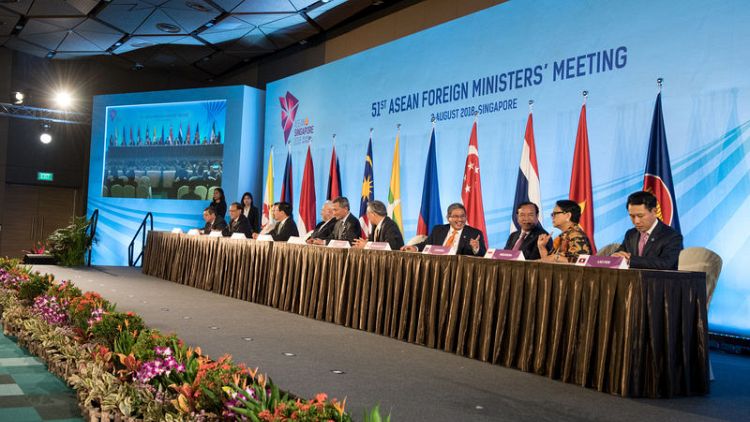By John Geddie and Christian Shepherd
SINGAPORE (Reuters) - Southeast Asia and China have agreed on a working text to continue long drawn-out negotiations over a code of conduct in the disputed South China sea, with officials on Thursday lauding it as a "milestone" and "great progress".
Some members of the Association of Southeast Asian Nations (ASEAN) and China have overlapping claims to islands in the sea, one of the world's busiest waterways. For years they have been discussing a pact to prevent an escalation of disputes.
"I am pleased to announce yet another milestone in the COC (code of conduct) process," said Vivian Balakrishnan, the foreign minister of Singapore, who is hosting the meeting of regional leaders and lawmakers from around the world in the city-state.
He said the "single draft COC negotiating text", agreed at high-level talks in June but only announced on Thursday, would serve as the basis for negotiations.
His Chinese counterpart, Wang Yi, called the working text "good news" and "great progress".
Critics say the consensus approach to negotiations on the code could mean a final deal is still years off and works in China's favour as a delaying tactic to ease scrutiny of its militarization of man-made islands in the region.
Officials of the 10 nations of the ASEAN grouping also met counterparts in Russia, Japan and New Zealand.
A draft version seen by Reuters before ASEAN's meeting with Russia said the bloc would seek to strengthen its cooperation on cybersecurity with Moscow, which the United States has accused of election meddling, by issuing a joint statement of "cooperation in the field of cybersecurity".
The final communique released late on Thursday made no mention of this, however.
Singapore suffered its worst cyberattack this year, when hackers stole the personal information of about 1.5 million people, including Prime Minister Lee Hsien Loong, from a government health database. Malaysia this year said it had foiled a cyber heist of its central bank.
Neither country has identified the hackers.
U.S. intelligence agencies have said a Russian propaganda arm tried to tamper with the 2016 presidential election by posting and buying ads on Facebook. Moscow has denied involvement.
In its joint statement, ASEAN also reiterated its commitment to wrap up a major trade pact backed by China, against the backdrop of protectionist trade policies adopted by the United States, and urged progress towards peace and stability on a denuclearized Korean peninsula.
TRADE "CENTREPIECE"
Many Southeast Asian countries have been unsure of U.S. economic policy towards the region since President Donald Trump won a 2016 election promising to put "America First".
One of Trump's early acts in office was to pull out of the Trans-Pacific Partnership (TPP) trade agreement, which involved four Southeast Asian states.
U.S. Secretary of State Mike Pompeo is due in Singapore on Friday fresh from unveiling a investment pitch for the region, although many ASEAN members could be more concerned with a U.S.-China trade dispute that threatens to jolt their economies.
ASEAN pledged its commitment to the Regional Comprehensive Economic Partnership that includes China, saying it will form a "centrepiece of its external economic relations, particularly at a time of growing uncertainties in global trade".
Singapore's prime minister said the deal would create the world's largest trading bloc, spanning a third of the global economy.
ASEAN backed "the complete, verifiable, irreversible denuclearization" of the Korean peninsula, saying it welcomed a pact between the United States and North Korea at June's landmark summit in Singapore.
On the sidelines of the event, China's top government diplomat, Wang Yi, called for a push to establish a peace mechanism as well as denuclearization.
China, along with North Korea and the United States, is a signatory to the armistice that concluded the 1950-53 Korean War, rather than a peace treaty.
The United States has said it will press Southeast Asia to keep up sanctions on Pyongyang during the meetings.
(Reporting by John Geddie, Christian Shepherd and Jack Kim in SINGAPORE and Manuel Mogato in MANILA; Editing by Paul Tait and Clarence Fernandez)
